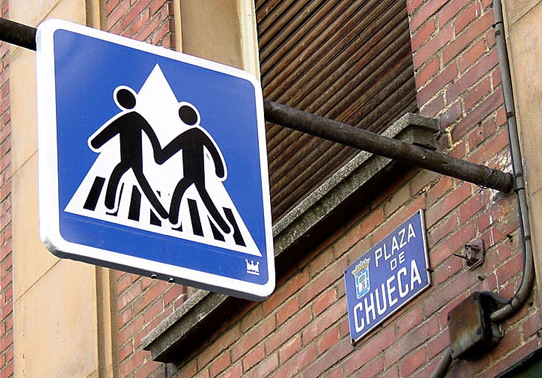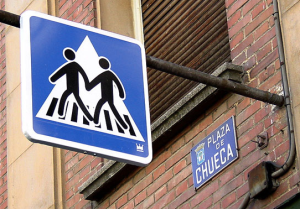My last night in Paris, I unexpectedly ran into an old friend at a club. Perhaps unexpectedly is an understatement. I last saw the man three years ago when we were singing in the choir of the American Cathedral in Paris. I assumed he and his wife and two children had long since moved back to the land where they drive on the wrong side of the road and spend an hour and a half making tea, from whence they’d come on a two-year appointment for his wife’s job.
‘What are you doing here?’ I asked non-judgmentally.
‘My work mates and I are out on a lash-‘ (a lash, translated into American, is a memorable night of drinking which, in all likelihood, you won’t remember) ‘because Giles here is moving to Gambia to teach English.’
‘That’s fantastic,’ I said, and turned to Giles. ‘Are you going through World Teach? Or some organization like that?’
Giles giggled, and I realized he was probably wasted. ‘Why, then? Why Gambia?’
‘Why not?’ he countered.
Why not, indeed. I’ve decided to appropriate Giles’s moyen de vivre for the summer, which may help explain my apartment search.
I stayed my first few nights with the fiancee of a friend from home, but mindful of the adage that fish and houseguests go bad after three days, I had my eye out for a place of my own.
Compared to most capital cities, Madrid is very affordable: a centrally located studio runs in the 450-700 euro range, and a room in a shared apartment can be as low as 250 euro a month. I scoured a few Craigslist-type websites and narrowed my search to five habitacions (rooms in a shared apartment) which were reasonably priced and a comfortable distance from work.
I looked into the cheapest first. It was in the heart of Chueca, the gay district, populated primarily by shirtless men with the kind of muscles only elsewhere seen in Roman statuary. With my limited (but improving!) Spanish, I called the owner. He said something I interpreted to mean we would meet in front of the fruit shop with the pink awning at 5pm.
Pink may be an uncommon color in most urban settings, but in Chueca, I was surprised they managed to refrain from painting the fire hydrants magenta. Finding a pink fruteria in between the pink bars and pink convenience stores and pink travel agencies sounded about as easy as finding a gay Catholic priest. Plenty exist, but they sure are hard to distinguish from their surroundings.
In search of the fruteria, I got a chance to survey my prospective neighborhood. A dull thumping music was emanating from a bar with a pink awning and painting of a naked man looking coquettishly over his shoulder on the door: apparently 5pm is by no means too early to start the night’s partying in Chueca. There were about as many shoe shops as there were grocery stores, Tabacos, butchers, and bakeries put together. Most selling women’s shoes. There were also a number of people with pink eyes: I have not smelled so much marijuana since the Fridays in high school when the kids in the back of the bus would indulge in recreational chemistry instead of their usual Marlboros.
I was pretty sure I found the fruit shop in question at the appropriate time and waited. I smiled vaguely at passerby, none of whom were over forty or looked like they had been out of a gym for more than four hours. I sent a text message to the owner of the apartment: ‘donde eres? Estoy delante de la fruteria’ and within a minute, a ball of paper fell on my head.
Two stories above the fruteria, a bearded man with very good aim was waving and shouting ˜BUSCAS HABITACION?” (˜You’re looking for a room?”).
The bearded man and a 20-something woman wearing a purple shirt just covering her conspicuously fake breasts welcomed me on the second floor. They were offering a corner room with a slightly mildewy mattress (which is a feat, given Madrid’s dry climate) and a view into the airshaft. It gave off an unconventional odor of drying laundry mixed with ganja. The two burners in the kitchen looked like they hadn’t been cleaned since Franco’s era and the couches in the common area didn’t look much better.
‘So, are you interested?’ the bearded man, whose name was Pepe, asked.
Why not, I thought.
‘Yes, very! I’d move in right away, if you want.’ Say what you will, the place had character.
‘We’ll have to get back to you: we have three more people coming to look tonight.’
I was surprised. Did they really think they were going to find someone else willing to live in that hole? Was I too uninteresting to fit into their boho world? Was that something that should bother me?
The second apartment was a five minutes’ walk north in the student district of Bilbao. The entrance and the stairs were made of spotless white marble and the door was substantial: more than eight feet tall, green, with an elegant gold screen covering the peephole. I’ve always thought a door can say a lot about the people who live inside. I guessed that the inhabitants were rich, older than they admitted, and probably had a small white dog with curly hair that would shed on my laundry.
The girl who let me in, though, was wearing sweatpants and couldn’t have been over thirty. The living room was painted a light purple with a cheetah running across the walls. Everything looked lived in, but clean: a few cracked tiles, a few stains on the kitchen counter, the hardwood floor starting to come apart so that it clicked under my shoes as I walked down the hall.
I gave her the money for the deposit – the place was forty euros a month more than the one I’d seen in Chueca – and left a guidebook on my new nightstand to hold my place.
So here I am, living with a Spaniard, an Italian, a Colombian, and a Venezuelan in my very own auberge espanol. I just got a call from Pepe, though.
‘Are you still interested in the apartment? We’d love for you to move in right away.’
‘No, thanks, I said. ‘I’ve found one.’

